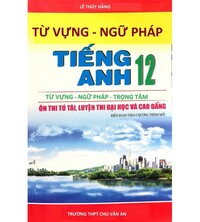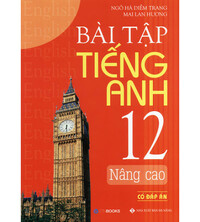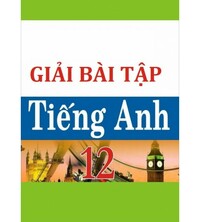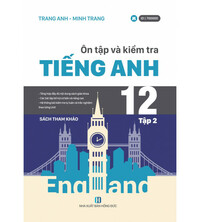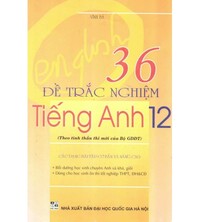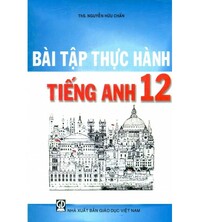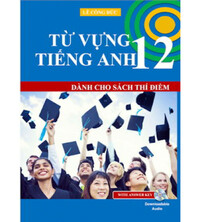Đề kiểm tra cuối kì 1 môn tiếng Anh lớp 12 có đáp án
Nhằm giúp các bạn học sinh có tài liệu ôn tập những kiến thức cơ bản, kỹ năng giải các bài tập Tiếng Anh nhanh nhất và chuẩn bị cho kì thi sắp tới tốt hơn. Hãy tham khảo Đề thi học kỳ 1 môn tiếng Anh lớp 12 trường THPT Hàn Thuyên, Bắc Ninh năm học 2016 - 2017 có đáp án.
Đề thi học kỳ 1 môn Tiếng Anh lớp 12 trường THPT Đào Duy Từ, Đăk Nông năm học 2016 - 2017 có đáp án
Đề thi học kỳ 1 môn Tiếng Anh lớp 12 Thí Điểm năm học 2016 - 2017 có đáp án
Đề thi học kỳ 1 môn tiếng Anh lớp 12 trường THPT Đa Phúc, Hà Nội năm học 2016 - 2017 có đáp án
Mark the letter A, B, C, or D on your answer sheet to indicate the word whose underlined part differs from the other three in pronunciation in each of the following questions.
Question 1: A. warned B. sacred C. decided D. hatred
Question 2: A pens B. books C. tables D. walls
Mark the letter A, B, C, or D on your answer sheet to indicate the word that differs from the other three in the position of primary stress in each of the following questions.
Question 3: A. determine B. vulnerable C. marvelous D. compliment
Question 4: A. individual B. academic C. compulsory D. documentary
Mark the letter A, B, C, or D on your answer sheet to indicate the correct answer to each of the following questions.
Question 8: ______________someone's attention so that we might speak to that person, we can use either verbal or non-verbal forms of communication.
A. To look for B. To keep an eye on C. To pay D. To attract
Question 9: Can you list the problems _____________ poor and ____________ countries?
A. facing/ overpopulation B. facing/ overpopulated
C. face/ overpopulated D. facing/ overpopulating
Question 10: It is considered to be ____________ to interrupt others while they are talking.
A. discourteous B. polite C. tolerant D. arrogant
Question 11: You will have to ________________ early if you want to avoid all the traffic.
A. come out B. set off C. put off D. keep pace with
Question 12: He __________________ in me on the understanding that I wouldn't tell anyone else.
Mark the letter A, B, C, or D on your answer sheet to indicate the word(s) CLOSEST in meaning to the underlined word(s) in each of the following questions.
Question 22: I'm a bit wary of giving people my address when I don't know them very well.
A. cautious B. upset C. willing D. capable
Question 23: The international fair served diverse foods, as the visitors were from 15 different countries.
A. various B. multiple C. plentiful D. common
Mark the letter A, B, C, or D on your answer sheet to indicate the word(s) OPPOSITE in meaning to the underlined word(s) in each of the following questions.
Question 24: The device is very sophisticated and should only be operated by someone who is familiar with it.
A. intricate B. complex C. fragile D. easy to use
Question 25: There have been significant changes in women's lives since the women's liberation movement.
A. unimportant B. great C. political D. disagreeable
Mark the letter A, B, C, or D on your answer sheet to indicate the sentence that is closest in meaning to each of the following questions.
Question 26: It is widely believed that hard work makes success.
A. Many people believe that if you want to succeed, you should work hard.
B. People think that success is when you work hard.
C. Believers of success think that we should work hard.
D. Many people think that success at work is hard
Question 27: The teacher: "You must take the graduation test this summer"
A. The teacher said that we must take the graduation test that summer.
B. The teacher said that we had to take the graduation test that summer.
C. The teacher said that we could take the graduation test that summer.
D. The teacher said that we were going to take the graduation test that summer.
Question 28: If it hadn't been for his carelessness, we would have finished the work.
A. He was careless because he hadn't finished the work.
B. If her were careful, we would finish the work.
C. If he had been more careful, we would have completed the work.
D. Because he wasn't careless, we didn't finish the work
Mark the letter A, B, C, or D on your answer sheet to indicate the sentence that best combines each pair of sentences in the following questions.
Question 29: Jim is my best friend. I borrowed his car yesterday.
A. Jim, whose car I lent yesterday, is my best friend.
B. Jim, whose car I borrowed yesterday, is my best friend.
C. Jim, who is my best friend, borrowed my car yesterday.
D. Jim, his car I borrowed yesterday, is my best friend
Question 30: She gets up early to prepare breakfast. She wants her children to be able to come to school on time.
A. Despite her getting up early to prepare breakfast, her children cannot come to school on time.
B. Because she wants her children to come to school on time, she gets up early to prepare breakfast.
C. If she does not get up early to prepare breakfast, her children will not come to school on time.
D. Unless she gets up early to prepare breakfast, her children will not come to school on time.
Read the following passage and mark the letter A, B, C, or D on your answer sheet to indicate the correct word or phrase that best fits each of the numbered blanks from 31 to 35.
There are many superstitions in Britain, but one of the most (31) held is that it is unlucky to walk under a ladder even if it means stepping off the pavement into a busy street! If you must pass under a ladder, you can avoid bad luck by crossing your fingers and keeping them crossed until you have seen a dog. (32), you may lick your finger and make a cross on the toe of your shoe, and not look again at the shoe until the mark has dried.
Another common superstition is that it is unlucky to open an umbrella in the house - it will either bring (33) to the person who opened it or to the whole household. Anyone opening an umbrella in the fine weather is unpopular, as it inevitably brings rain!
The number 13 is said to be unlucky for some, and when the 13th day of the month falls on a Friday, anyone wishing to avoid a bad event had better stay indoors. The worst misfortune that can happen to a person is caused by breaking a mirror, as it brings seven years of bad luck! The superstition is supposed to (34) in ancient times, when mirrors were considered to be tools of the gods.
Black cats are generally considered lucky in Britain, even though they are associated with witchcraft. It is especially lucky if a black cat crosses your path – although in America the exact opposite belief prevails.
Finally, a commonly held superstition is that of touching wood (35) luck. This measure is most often taken if you think you have said something that is tempting fate, such as "My car has never broken down, touch wood?"
Question 31: A. broadly B. widely C. quickly D. speedily
Question 32: A. Consequently B. However C. Comparatively D. Alternatively
Question 33: A. difficulty B. tragedy C. loss D. misfortune
Question 34: A. be originated B. be originating C. have originated D. originate
Question 35: A. as B. in C. for D. of
Read the following passage and mark the letter A, B, C, or D on your answer sheet to indicate the correct answer to each of the questions from 36 to 42.
Harvard University, today recognized as part of the top echelon of the world's universities, came from very inauspicious and humble beginning.
This oldest of American universities was founded in 1636, just sixteen years after the Pilgrims landed at Plymouth. Included in the puritan emigrants to the Massachusetts colony during this period were more than 100 graduates of England's prestigious Oxford and Cambridge universities, and these universities graduates in the New Word were determined that their sons would have the same educational opportunities that they themselves had had, Because of this support in the colony for an institution of higher learning, the General Court of Massachusetts appropriated 400 pounds for a college in October of 1636 and early the following year decided on a parcel of land for the school; this land was in an area called Newetowne, which was later renamed Cambridge after its English cousin and is the site of the present-day university.
When a young minister named John Harvard, who came from the neighboring town of Charlestowne, died from tuberculosis in 1638, he willed half of his estate of 1,700 pounds to the fledgling college. In spite of the fact that only half of the bequest was actually paid, the General Court named the college after the minister in appreciation for what he had done. The amount of the bequest may not have been large, particularly by today's standard, but it was more than the General Court had found it necessary to appropriate in order to open the college.
Henry Dunster was appointed the first president of Harvard in 1640, and it should be noted that in addition to serving as president, he was also the entire faculty, with an entering freshmen class of four students. Although the staff did expand somewhat, for the first century of its existence the entire teaching staff consisted of the president and three or four tutors.
Question 36: The main idea of this passage is that.
A. Harvard is one of the world's most prestigious universities.
B. What is today a great university started out small
C. John Harvard was key to the development of a great university
D. Harvard University developed under the auspices of the General Court of Massachusetts
Question 37: It can be inferred from the passage that the Puritans who traveled to the Massachusetts colony were.
A. Rather well educated B. rather rich
C. rather supportive of the English government D. rather undemocratic
Question 38: The pronoun "they" in the second paragraph refers to.
A. Oxford and Cambridge universities B. university graduates
C. sons D. educational opportunities
Question 39: Which of the following is NOT mentioned about John Harvard?
A. What he died of B. Where he came from
C. Where he was buried D. How much he bequeathed to Harvard
Question 40: The word "somewhat" in the last paragraph could best be replaced by.
A. Back and forth B. to and pro C. side by side D. more or less
Question 41: The word "fledgling" in the third paragraph could be best replaced by which of the following?
A. Newborn B. flying C. winged D. established
Question42: The passage implies that.
A. Henry Dunster was an ineffective president
B. Someone else really served as president of Harvard before Henry Dunster
C. Henry Dunster spent much of his time as president managing the Harvard faculty
D. The position of president of Harvard was not merely an administrative position in the early ears
Read the following passage and mark the letter A, B, C, or D on your answer sheet to indicate the correct answer to each of the questions from 43 to 50.
Basic to any understanding of Canada in the 20 years after the Second World War is the country's impressive population growth. For every three Canadians in 1945, there were over five in 1966. In September 1966 Canada's population passed the 20 million mark. Most of this surging growth came from natural increase. The depression of the 1930s and the war had held back marriages, and the catching-up process began after 1945. The baby boom continued through the decade of the 1950s, producing a population increase of nearly fifteen percent in the five years from 1951 to 1956. This rate of increase had been exceeded only once before in Canada's history, in the decade before 1911, when the prairies were being settled. Undoubtedly, the good economic conditions of the 1950s supported a growth in the population, but the expansion also derived from a trend toward earlier marriages and an increase in the average size of families. In 1957 the Canadian birth rate stood at 28 per thousand, one of the highest in the world.
After the peak year of 1957, the birth rate in Canada began to decline. It continued falling until in 1966 it stood at the lowest level in 25 years. Partly this decline reflected the low level of births during the depression and the war, but it was also caused by changes in Canadian society. Young people were staying at school longer, more women were working; young married couples were buying automobiles or houses before starting families; rising living standards were cutting down the size of families. It appeared that Canada was once more falling in step with the trend toward smaller families that had occurred all through the Western world since the time of the Industrial Revolution. Although the growth in Canada's population had slowed down by 1966 (the increase in the first half of the 1960s was only nine percent), another large population wave was coming over the horizon. It would be composed of the children who were born during the period of the high birth rate prior to 1957.
The end
ĐÁP ÁN Đề thi học kỳ 1 môn tiếng Anh lớp 12
| 1 | A | 11 | B | 21 | A | 31 | B | 41 | A |
| 2 | B | 12 | D | 22 | A | 32 | D | 42 | D |
| 3 | A | 13 | B | 23 | A | 33 | D | 43 | C |
| 4 | C | 14 | B | 24 | D | 34 | C | 44 | A |
| 5 | C | 15 | B | 25 | A | 35 | C | 45 | C |
| 6 | A | 16 | C | 26 | A | 36 | B | 46 | D |
| 7 | C | 17 | D | 27 | B | 37 | D | 47 | D |
| 8 | D | 18 | C | 28 | C | 38 | B | 48 | B |
| 9 | B | 19 | D | 29 | B | 39 | C | 49 | A |
| 10 | A | 20 | B | 30 | B | 40 | D | 50 | B |
